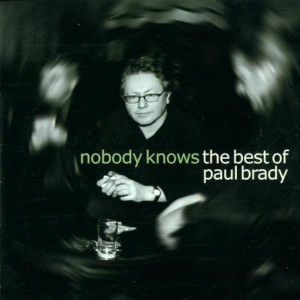 Chris Woods wrote this review.
Chris Woods wrote this review.
Okay, hands up anyone who has heard of Paul Brady? On second thought, that’s a silly question to ask here because you are reading this review. Maybe we should try the question on a typical group of Saturday shoppers in a high street music shop. I’m sure that (outside Ireland) the outcome would be rather a lot of blank looks.
Despite his having made music for many years, worked with a number of well known musicians, and having a good number of dedicated fans worldwide, he is still a well kept musical secret to most of the world at large. I have to confess that, until relatively recently, I too hadn’t realised the full quantity, quality and scope of his work. His name has popped up regularly in my (folk-oriented) record collection since the Sixties when he was a member of the Johnstons and later of Planxty. He then departed somewhat from the folk and traditional scene before returning once again to work alongside Irish musicians like Liam O’ Flynn and Andy Irvine. In between these times of working with more traditional music and musicians, however, Paul Brady has managed to release a significant number of albums of his own work which tend to show a different musical side of his character.
This retrospective collection pulls together tracks from over half a dozen albums, released through the Seventies, Eighties and Nineties, and it demonstrates quite a wide assortment of material and musical styles. Ranging from traditional songs to slightly bluesy ballads, these songs sometimes tend towards a Van Morrison sound and at other times tend towards an almost mainstream, commercial sound. Mainstream enough to have given him a number-one hit in Ireland in the early Eighties and gigs supporting both Dire Straits and Eric Clapton on tour.
Obviously, with such a mixture, there are some tracks I like more than others. That’s as it should be, but I have to say that in my opinion there isn’t a bad track anywhere on this album, an opinion which strengthens with each replaying of the album.
The CD opens up with its title track “Nobody Knows,” originally released on the 1990 album Trick Or Treat. This track (along with “Trick Or Treat” which appears later in the running order) demonstrates the more “pop” sounding arrangements which I find a little too polished and programmed for my taste. However, as with most of these songs, it is the lyrics which shine through and tell the story. The arrangements may be more mainstream, but the words are considerably more meaningful than typical pop music.
In contrast, the second track, the lyrically simpler “The World is What You Make It” is from the mid-Nineties Spirits Colliding album. The liner notes say this is the original demo, recorded at home, as he was persuaded to use it rather than re-record it. Certainly, it doesn’t have the studio polish, and it’s a much simpler song. But, to my mind, it has more charm and directness.
Track three is an atmospheric, slowly building ballad from the mid-Eighties Primitive Dance album and is followed by the early Eighties song “Nothing but the Same Old Story” from Hard Station, this being one of the tracks that reminds me a little of Van Morrison. The fifth song is the wonderful “The Lakes of Pontchartrain,” which is the only new recording on the CD. I believe this is because the original appeared on/ Welcome Here Kind Stranger, which is not currently available.
Most of the rest of the CD continues in a similar vein, taking about two songs from each of Brady’s albums to make up the 14 tracks and almost 76-minute running time. The final track is the most recent recording, “Arthur McBride,” taken from the 1999 Andy Irvine / Paul Brady album. This neatly closes the collection and runs Paul’s career, to date, full circle, it being one of the traditional tunes from Paul’s live set after the break-up of the Johnstons (and of course Andy Irvine being one of Paul’s long-time musical accomplices from Planxty way back in the Seventies).
I have no hesitation whatsoever about recommending this album to anyone wanting to explore Paul Brady’s material. Indeed, anyone wanting to “discover” a new artist to enjoy on the mainstream edge of the folk spectrum would be well advised to give this selection a listen. It’s a superb introduction to Paul Brady’s work. The songs are wonderfully written and can be rewardingly listened to at either the level of “background” music or with one’s full attention. The running time of the CD is generous, without any hint whatsoever of “filler,” and the song notes in the insert are an informative and interesting bonus to understanding the man and his music.
For someone who is already a Paul Brady fan, there is probably less point in buying this collection, but it’s worth noting that almost all his albums are currently being made available, so now is a good time to think about filling gaps in the collection.
(Rykodisk, 1999)
